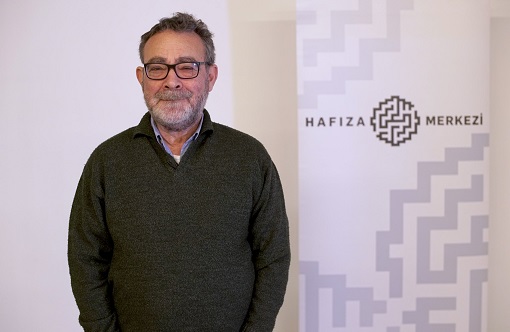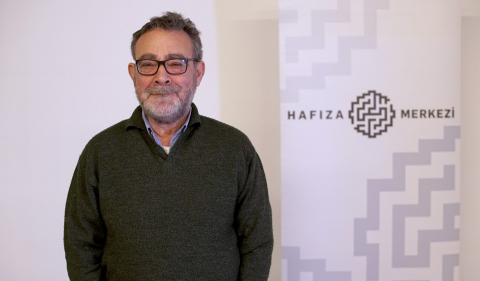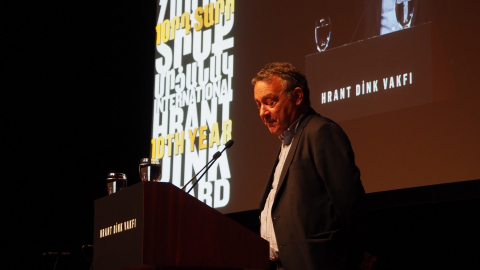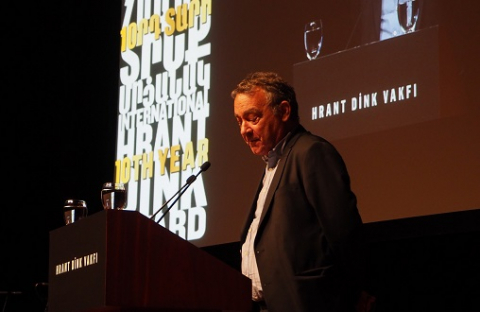
Interview with Murat Çelikkan: "I stand on the shoulders of giants"
On the 13th of April our Co-Director Murat Çelikkan received the Civil Rights Defender’s Civil Right Defender of the Year 2018 Award in Stockholm. During the ceremony he was interviewed by Goran Miletic Programme Director for the Western Balkans.You are one of the most prominent voices of the human rights in Turkey. Your mission both as a journalist or as a human rights activist resisted the political circumstances and you pursued your struggle over the years. But it seems recent years are particularly difficult for you and your work. Could you agree that these are the most challenging years in the last four decades? Well thank you. I am 60 years old. During this 60 years I witnessed 3 Coup d’etat, 1 postmodern Coup d’etat and several unsuccessful but very harmful Coup d’etat attempts. With the first two, the 1960 and 1970 coups my mother was imprisoned as a journalist. With the 1980 coup I was. And almost 40 years after that imprisonment I was imprisoned again very recently after the unsuccessful coup attempt of 15 July 2016. I should also mention years of unending state of emergency, both in the 90s in the Kurdish region and now all over Turkey. So I can be considered an expert on the oppressive times and nature of the Turkish state. Still I don’t think it is wise to compare one period with another. But what is special for this period is unlike the other ones there is no military rule and government, no military courts for the trial of the opposition. But an elected government and civil courts that are hardly independent. So there is no short term hope of a change in governance from military to civilian from authoritarian to democratic. This time it is harder to see the light at the end of the tunnel or rather the light at the end indicates the speed train coming towards you. When did you first time become aware and concerned (in your own work) about human rights violations and endangered democracy in the light of recent coup attempt? Well the starting point for everything was the end of the peace process right after the elections in 2015. It, gave way to increased violence in the Kurdish cities, causing a lot of deaths and unidentified bombings of civilians during peaceful demonstrations and also bombings of the security personnel. That was the turn of the screw. A prominent Kurdish lawyer and human rights defender Tahir Elçi, who had always been against violence and in favor of peace, was assassinated during that period. His assassins are lost in the labyrinths of impunity in Turkey. The Kurdish MPs as well as mayors, journalists and civil rights defenders were targeted at that time. After the failed coup attempt, state of emergency was declared which is still active today and Turkey was ruled with state of emergency decrees. More than a thousand civil society organizations were banned. Thousands of civil workers (teachers, judges and prosecutors, military personnel, police) were sacked. Anyone in favor of the peace process which meant a different position than the government and the president were targeted. That was the critical point. Journalists, peace academicians, actors, lawyers and human rights defenders were targeted. A witch hunt begun which is still going on. (In the movie) You said that there is not much hope but again that you believe that struggle for democracy will continue and will succeed in the end because people want democracy. How optimistic are you about Turkey's near future and Turkish human rights defenders? Human rights work is a collective work. I am here not only because of my work but also because of the efforts of my colleagues and the human rights defenders in my country. I am here because somebody marched, somebody went to prison for their beliefs. I am here because a number of human rights defenders like Hrant Dink, Tahir Elçi lost their lives in this struggle. I am here because the women in Turkey keep marching for their rights, I am here because despite all the obstructions and threats the LGBTI society decisively will try to march for the pride. I am here because people mothers and wives has been sitting in squares asking for the fate of their loved ones, I am here human rights defenders try to document violations and they all keep doing this under very harsh conditions. I stand on the shoulders of giants. Giants may sleep for some time but hardly die. And they have a strong memory. What do you expect EU or foreign governments should and could do to help civil society in Turkey in their efforts to restore democracy and justice? This is a hard question for me. Should I answer with my emotions, and say first let them solve their own problems, let’s see their respect for human rights which diminishes with every trade or arms agreement, their respect for the lives of others which makes them sign treaties for refugees, the most vulnerable of people, and try to keep them in a country as a safe country where the country is not safe. The priorities of western governments in the wars in the middle east is almost never on the side of human security. Despite all the talk and mechanisms for early warning, conflict prevention, and post-conflict rehabilitation, European governments are desperate when there is a crises. I may criticize all that hypocrisy. Or should I answer it rationally and say that the accession period to EU is still important for democratization in Turkey. That the Council of Europe Human Rights Commissioner did an extremely wonderful job although his efforts were not enough to persuade the General Secretary of the Council. European convention of Human Rights, which Turkey is a party to is still very important. I should say I am a rational human with emotions. What motivates you to continue, what drives you and keeps you going in your struggle for human rights? I may say the giants whose shoulders I stand on. But personally my main motive is disgrace. I can not deny who I am, what I believe in most importantly my conscience to act otherwise. Of course for fear of my future, the future of my kids and family and friends I am sure I am censoring myself to a certain degree. But the hardest thing for an individual I believe is the denial of who you are. That I hope I will not have to do! How significant is this award for your work? I am very happy and greatly honoured to receive the award. This is acknowledgement of the collective work of human rights defenders in Turkey. So this is a recognition and celebration of a long time work and dedication of numerous individuals. The award gives me more responsibility now I believe and it is very good to see that our efforts in this struggle were recognized. As mentioned before, I was not alone on that journey so I dedicate and share the award with my colleagues at Hafıza Merkezi, symbolically with my friend Osman Kavala who is a defender of democracy and is currently in jail, with my colleague Eren Keskin who is threatened daily with imprisonment and alas unfortunately seems to be ending there. And with all imprisoned journalists, with all peace academicians who had lost their jobs, rights, who are convicted to a civil death and who are in jail for doing their job and defending freedom of expression and freedom of press.



